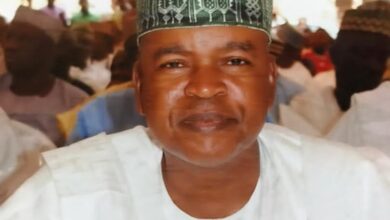What Nigerians should know about sex offenders register – RoLAC official
In this interview with Priscilla Ankut, who heads the access to
justice for women, children and persons with disabilities under the
Rule Of Law and Anti-Corruption (RoLAC) Project; a programme funded by
the European Union and implemented by the British Council in Nigeria,
speaks on the launch of a register for tracking and prosecuting sex
offenders in Nigeria. Excerpts:
What gave birth to the idea of the sex offenders register?
While we are also trying to tell people that we have a sex offender’s
register, we are also trying to let people know that if they have been
violated or experienced a case of sexual assault this is a place you
can seek help.
Who is hosting the sex offender register and what will be on it?
Let me situate this within the context of the law. This is a creation
of the Violence Against a Person Prohibition Act (VAPPA) 2015. The law
itself provides the legal framework for the establishment of the
sexual offender’s register specifically S.1(1) of the VAPPA 2015. The
same law names NAPTIP as the agency responsible for its
implementation. However, it is by no means the only agency
responsible. It is the regulatory body, but it is actually that area
that intersects. You have agencies like the ministry of women affairs,
the police, the civil defence etc. So all of these agencies together
with civil society actors who do work in this area of sexual and
gender-based violence each have a role to play in ensuring the act is
implemented. However, for the register itself, it is by law supposed
to be kept by NAPTIP, but not alone.
Who are the partners creating the register?
NAPTIP will work in collaboration with the police and the civil
defence agency as the primary data entrance of the agency. These are
the primary agencies that have access to the database that will serve
as the register.
To speak to what type of information will go into the register, it
would be good to note that ROLAC did a lot of background research and
have been working on this for about a year now. We hired a consultant
to help with the research, we studied other climes like South Africa
and the UK and even states in Nigeria like Ekiti and Lagos. We looked
at all existing models and decided that we will put together a digital
platform and there are three categories of data that we hope to see in
this platform.
The first is cases that are reported; like cases in the newspaper or
social media. Where it seems to be the case that there is an active
citizen reporting going on due to its enabling environment; we hope
that this would reflect in the database, but more for monitoring
purposes and to keep track. One of the challenges we have with SGBV in
Nigeria, is the absence of data on the issue. Recently NOI Polls did
an annual report of rape in Nigeria and they reported that at least 85
per cent of Nigerians now know that there is an increase of sexual
violence. More people have started talking about these issues and we
want to capture it. This category is not open to the public.
The Second Level is of those who have been arraigned and tried. Once
you are brought before the court, your data is captured on the
register but is not available to the public. There has to be
additional administrative level request that allows people to see that
you’re there in the register, it is a bit more stringent. This level
could aid background checks.
The third level of data that goes in is convicted offenders. And if
you’re a first-time offender, your name maybe moved off the public
record after sometime if the offence is not repeated. Other things
that we find with sexual offenders is that they are always repeat
offenders, so to guard against labelling, we hope to remove first-time
offenders, off this public list after a period of 10 years.
There would also be a special level of the register for young
offenders below the age of 18. And by law and virtue of their age you
cannot display such child/young offender’s names publicly. These names
would not be for public view.
What type of information will be on the register regarding sex offenders?
The type of information of a convicted person that would be captured
include: Bio-data, Biometric features, Addresses, BVN, DNA. We are
linking these with the NIMC, all geared towards preventing repeat
offenders. The idea is that because this is a digital platform, that
it would be accessible both locally and internationally. The ambition
of this database is to put out a clear stand against offenders and let
them know that there is no hiding place for sexual offenders. Our
vison is that this register is available to INTERPOL for better
policing of this crime, it is very serious business.
How would you like Nigerians to conceive of the register?
It is a register of offenders and also a service provider’s database
so that we register organisations also that are giving services to
victims of violence. In the long-term vision, we also hope that it
could be a potential source of income for agencies operating it with
payments made for check and more.
How do you intend to sustain this register?
We have put together what we call, a high-level multi-agency task
force team that would oversee this. We appreciate that though NAPTIP
is overseeing this, they cannot do this alone. So, though the register
is domiciled with NAPTIP, agencies such as the police, the civil
defence corps, the National Human Rights Commission, The Nigerian
Bureau of Statistics, the correctional centres and the NMIC are all
going to be involved in performing different duties.
We also have from the service providers’ perspective, another
co-ordinating body which we call “The service providers accountability
platform.” This is the association of service providers that would set
standards for themselves, monitor each other and oversee what NAPTIP
is doing. This platform would be working together with the task force
to provide the preventive, psychosocial, rehabilitative and legal
support that would be needed by the victims. We invite all these
service providers to register and be validated.
Above all, this system of dual checks and balances is to ensure
accountability. The taskforce and service providers platform has been
formed and they have been meeting towards the launch and
sustainability of the register.
What are the risks you anticipate with this register?
Note that we already have some that are against this register, and
questioning the rationale of some levels of the data using the fact
that everyone is innocent until proven guilty. We have a few risks
around discordance amongst key government agencies. We have not had a
history in this country of coordinating well when it comes to data so
the question of how to coordinate well to get through this process is
a risk. There are definitely risks around data insecurity, but we hope
that we have built a system that is solid enough to respond to these
issues. We also run the risk of false allegations and people abusing
the register.
Already what we are seeing is a proliferation of registers, with
different states having different registers, so we are taking a step
back to understand how we can re-align. We appreciate that the VAPPA
is not widely enacted and thus the legal issues of having the name of
a citizen on the register that is from a state without the enabling
law is a risk we are aware of.
Some of these can be navigated, but we appreciate that this is a
process in evolution and for many risks we just have to see how it
goes. We hope to launch it still to mark the beginning of the 16 days
of advocacy.
Culled from: Premium Times





